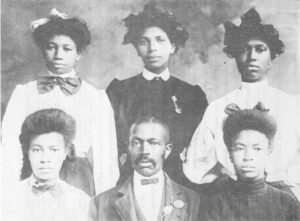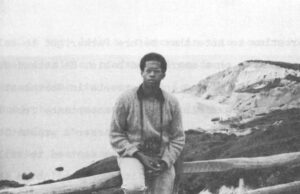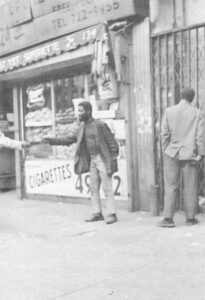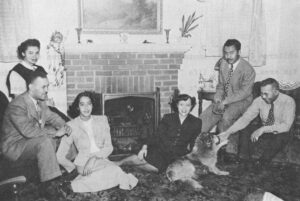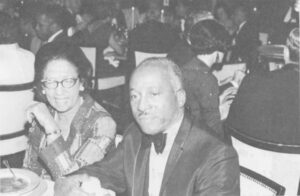The Washington fall morning is fresh and dew-drenched and full of the sounds of birds enjoying the yellowing leaves before they must fly south to sunshine. The 1974 red Thunderbird purrs down the asphalt ribbon of route 95 heading south and away from the morning’s stillness. At the wheel is Gordon Southall, the grandson of Robert Shelton Jones, who was born a slave In Albemarle County, Virginia, and who told his daughters before he died that he wanted them to be “somebody,” and forbade them to listen to “anybody who will tell you that you can’t.” Southall’s mother, Nellie Jones Southall, died on September 5, 1972, and on this crisp morning, slightly two years after her deaths Southall is taking a visitor back to the land of his grandfathers back to that place that smells not so much of pain, now, as of endurance. We are going back to that part of black America that always seems the strongest because it knows its roots, and because it has found in its capacity to survive, an authority of self that is nearly unassailable.
We are on our way to see Edward J. Brown, the oldest surviving nephew of Robert Shelton Jones, and a man who, having been born in Profitt, Virginia in 1892 decided quite early in his life that there was no view in the world to compare with the Blue Ridge Mountains near to his home, no work as rewarding as planting his own fields and raising his own hogs. And although World War I took him to France and Belgium and Germany, he remains convinced that the trees and the grass and the soil of Profitt remain special.
The hamlet of Profitt is so small that although, officially, 200 persons live there, there is no sign on Route 29 outside of Charlottesville that points in its direction. The main store, The Profitt Exchange, is now closed, its windows weather-beaten, its painstakingly handwritten signpost flaking from age, and cobwebs forming intricate patterns on its front door. No one shops in Profitt anymore, and this rural community must make the trek Into Charlottesville every Saturday to the supermarkets and the sales. And on Sundays, the village’s black community goes to the white, wooden frame building called the Evergreen Baptist Church, with its green shutters, its well-worn pews and its abundance of wild flowers.
It is in this environment that Edward J, Brown was born and it is here that he will die. And although he is stooped now, and must get around with cane, his wit is still penetrating and his understanding of the kind of life that he has led, still clear. He meets a visitor at the door of his white and green frame house, and mutters his welcome. After he has shown me to the living room, he pulls his chair directly into the sunlight, and sits down to listen to my request for Information. For a while he does not answer, and I am not sure if the slight rocking of his body means that he is lulling himself to sleep. When I try to ask another question, he abruptly raises his right hand and says: “Wait. I’m summoning up my memory.” After a few more nods, the torrent begins and Edward J. Brown cannot stop.
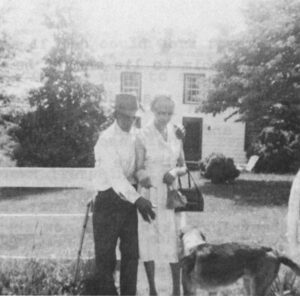 | Edward and Fanny Brown in front of their home in Profitt, Virginia. |
“I was born In Proffit in 1892 in a little house not far from where the Evergreen Baptist Church is now. My father Edward Ned Brown was born in 1848,a slave on a plantation nearby. Only it wasn’t really a plantation like those you had down In the Deep South. This one was more or less a farm with a few slave hands planting corn, tobacco and wheat and raising lots of livestock. I don’t know for sure about all this, and I can only tell you what my father told me. But I never knew him to lie and if he said that was the way it was, that was the way it was. He was 17 when the war ended and slavery was no morel and he could remember a lot about those days. He wouldn’t tell us just like that about what went on. You had to press him. You had to get him on his good side, and then he would say something like: ‘Boy, now why you worrying yourself about what done passed?’ But we wanted to know how people could think they could own somebody and sell him like a pig or a cow. My father was never sold. He grew up working for one man, a lawyer, and after the War and everything, my father bought 75 acres here in Albemarle County. This same lawyer fixed up the deal. Now, don’t ask me where my father got the money from. That was a sore subject around here. He wouldn’t tell, and we knew we were not supposed to ask. He wasn’t the lawyer’s son (you know a lot of those slave owners made love to slave women) but he was hard worker, and the land was only $5 per acre. He had to sell some of it off to pay taxes and to get money to live on in the early days. But it was a good deal. A good deal. Just last year, I sold four acres at $2,000 per acre to a couple of relatives. Just relativese I won’t have anybody else coming close to this land.
Well, to get back to where I was. When I came around in 1892, things were terrible for the black people. I was in the fields by the time I was 8, and there was so much work to do, it seemed as if you could work forever and the work would still be there. My father used to say that he wouldn’t give up this freedom, no matter how hard he had to works because he was working for himself. And one night I remember as a little boys I was sitting down listening to the older people talks and they were telling stories about the days when their coming and their going was controlled by one man. And somebody said, “Oh, I ate good in those days,” and another one said: “Slaves had a sense of humor; now, nobody can see a good joke.” A woman who lived around the corner from us asked them if they remembered how the patrollers used to break up the church meetings, and how those standing guard would give the signal when they heard the patrollers coming. And then she started to laugh. She said: “We fooled the patrollers all the time. They would hear singing and praying and they would set out to catch us. But by the time they came, we had gone like ghosts. We were too smart for them.” Then my father who never liked to remember the past, said to them: ‘Why don’t you all go back to those days?’ And they said: ‘Oh, no, never. We just like to talk. We just like to see how God done change things from one season to another.’
We never really had any trouble in Profitt. Many of the white people around here were as poor as any of us by the time I went off to Europe. And when I came back they didn’t seem to have much. Of course, they thought they had a lot. They had colors but that don’t make the corn grow or the hogs get fats and pretty soon they realize it. Although, deep down, they still think they should give you orders. Fanny [his wife] will tell you about some of them.”
Edward Brown takes a visitor on a tour of his farm. The land, here, is full of pine forests and the Blue Mountains seem to act as an outer rim for this, as yet, unspoiled part of America. The air is crisp, and the old man involuntarily shudders as he leads the way to the chicken coop, and to the small vegetable garden where his wife has planted strawberries and collard greens and spinach. “I can’t get around so much anymore. What I used to do in two hours, it now takes me two days, and I don’t like it. I don’t like it one bit. But I did paint my white fence this week, and maybe next week, I’ll do some painting on the house. But we don’t have much to look forward to now. The farm is all paid for. We only have 30 acres left out of the 75, and we can’t farm any of the 30. Too much trouble. Laborers steal you blind, and I can’t run behind them anymore. Besides you can’t find them. They leave here as quickly as they grow up. They head north. What for, I don’t know. Here we have something. We have land. We have fresh air. We have our own pigs and cows and chickens. I hear now with this Inflation business, people can’t afford to eat meat. Well, we never got there. We never come to that here. We have our own.”
I ask Edward J. Brown about Robert Shelton Jones, the man whose determination was legendary in Profitt, who told everyone that his daughters would be achievers. These women understood his admonition; and with rectitude, common sense and hard work, they pushed their progeny into the heart of the black American middle class. Edward Brown says, “You couldn’t beat that little man. You just couldn’t get him down. He and my mother Polly were brother and sister, and my father Edward Ned Brown, knew them all as children. Now the way I understand it, Robert Shelton and his brother Watson were sold from around here, and sent to Florida. After the War, they came back home and they brought back some reading and writing. The Florida mistress taught them to read and write when nobody was looking* They said that she was a good woman, but they didn’t know anything about Florida, and they wanted to come back to Albemarle County. So although this woman who they used to fan (it’s mighty hot in Florida, you know) took a liking to them and wanted them to stay, they lit out from there, and walked all the way back to meet us in little old Profitt, U.S.A.
Robert Shelton was born around the same time like my father. Not he was about two years older, so you see they were young men together and good friends. He would come to our house all the time. He was more than just family, because he was older, he could read and write, and he was always talking about building up yourself. He married the local beauty, Caroline McDaniel, and when she died about 1894, Robert Shelton brought up his girls by himself. I heard that everybody told him to marry again, but he said that, he could never find someone like Caroline again. You know he was a short man, but he carried himself well. Erect. And he was always well dressed. Always wore a black suit on Sundays. Always wore bleached muslin. He would not wear rough clothes. To tell you the truth, some people around here thought that he loved to put on airs, but I always say that people will talk about you if you want to make something out of your life. One night he was talking with my father just before he died, and they was [sic] talking about the old days and the hard times. And Robert Shelton said something like ‘life is good cause God gave it to you, but man makes it an abomination,’ and my father said, ‘Yes. But you can’t give up.’ Then Robert Shelton said: ‘I could never give up. There were times when you needed a strong heart to see the sunshine in this country, but I always knew that sunshine was there.’ He was a deacon in the church, you know.”
Fanny Daniel Brown, 81 years old, and as fast moving as a woman half her age, calls from the kitchen to summon us for lunch. During a meal that consists of fried chicken, potato salad, collard greens, tomatoes and hot rolls, Ms, Brown tells us that she has never lost her zest for life, “I have been Inquisitive for as long as I can remember. I have an active mind. If someone is hard to get close to, I want to know why. I want to know what makes him tick.” And so it is not surprising to learn that she left Kansas when she was 18 to visit relatives in Arkansas. “I told them that I would soon be back, but Kansas seemed too small for me. I had a notion that I ought to travel.” She went from Arkansas to Texas to Amherst, Mass., where she met a wealthy, young white woman who became her friend. They traveled to Profitt, Va., where the woman’s family had a plantation. She saw Edward Brown and returned the next year, to give up her dreams of travel and to settle In the kind of backwater that she had always tried to avoid. “I have no regrets,” she says. “Besides I always wanted to know what made uneducated poor whites think that they are lucky.” She gets along with her neighbors, she says, not so much out of attraction, but on the “belief that when you are in Rome you follow the Romans, as long as they don’t mess with you.” She Is the mistress of one of the larger homes in Profitt, she owes nothing, she asks for no favors, and she has had to remind a few of her white neighbors of their indebtedness to her, when they have tried to pull rank on her black friends. “They wouldn’t try any nonsense with me,” she says. “They know me too well. They know that I have a Yankee tongue.”
As the afternoon creeps in, Edward Brown goes for a drive with his second cousin, Gordon Southall and a friend. We are searching for the old homestead of Robert Shelton Jones. The area has changed Immeasurably. Redbrick townhouses, brown shingle Cape Cod homes and single-family ranch houses dot the landscape. We are in the suburbs of Charlottesville, and the little town of Union Ridge is being absorbed in the drive for individual plots of grass and mechanized lawn mowers. Only the Union Ridge Baptist Church, a white and green frame structure with a red roof and a small steeple remains unchanged. We pass the huge Albemarle High School with its brick and Doric columns, and its resemblance to a factory; we pass the Hilltop Grocery and the future home of the Hop-In Food Store before we are in front of the land that used to be known as Maple Hill, and where Robert Shelton Jones planted his corn and dreamed his dreams. We are on route 631, a curving dual carriage highway that speeds the new managerial class into their jobs in Charlottesville. Edward Brown remembers a quiet time in these fields, and he looks around for a maple tree here, a pine tree there, that could invoke memories. “Everything has changed,” he says, “and people are always saying that it is for the better. But I don’t know. We could hunt here. We could fish. You still can, I suppose, but who would want to, with so many people breathing down your neck.”
Nothing remains on this land to remind one of Robert Shelton Jones. His descendants have long ago sold the land and moved North to success and achievement. Only Edward Brown, a cousin, remains. He is the only link, now, with what the past must have been like for this family. And he is 82. He and Fanny have no children, although she has some cousins in Washington to whom they are close, and to whom they sold some of their land. But these cousins, far removed from the smell of the soil, only want to build a summerhouse here. “They say they like the Blue Mountains,” says Fanny, “but the only animals they want to see are dogs and cats. They have no feeling for farming.”
And so Edward Brown spends much of his time in the house his father started in 1925, and into which he moved, after some additions in 1939. He looks at television only when General Hospital and Bonanza are showing, and he says sadly, “I miss the old people, now. They speak my language, but the young ones don’t. They are shacking up together and taking drugs. I don’t like how they treat this sex business, and I don’t want to have much to do with them.” And when Fanny rises to the defense of the young and says: “Judge not so that you be not judged. How do you know anything about the young people? It’s a different time.” Edward Brown looks at his visitors and then waving his cane toward the Blue Mountains in a kind of benediction says: “Those mountains are going to be here long after we go, Fanny. There’s always time to be decent, to work hard, to live with one woman rather than twenty. I don’t know where all this change is taking us.”
Received in New York on December 9, 1974.
©1974 Orde Coombs
Orde Coombs, a freelance writer is an Alicia Patterson Foundation award winner. This article may be published with credit to Mr. Coombs and The Alicia Patterson Foundation.

